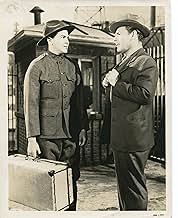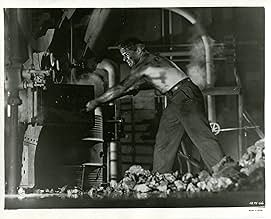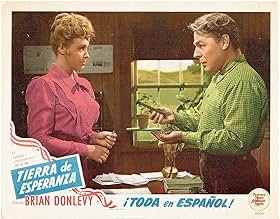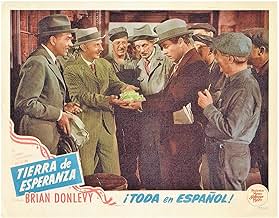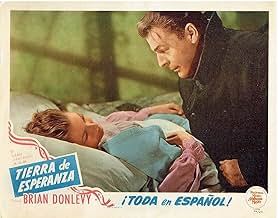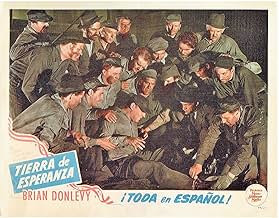Stefan Dangos emigra para a América e parte das minas de ferro e aço para se tornar uma grande história de sucesso americana como industrial.Stefan Dangos emigra para a América e parte das minas de ferro e aço para se tornar uma grande história de sucesso americana como industrial.Stefan Dangos emigra para a América e parte das minas de ferro e aço para se tornar uma grande história de sucesso americana como industrial.
- Direção
- Roteiristas
- Artistas
- Prêmios
- 2 vitórias no total
Stephen McNally
- Teddy Roosevelt Dangos
- (as Horace McNally)
- …
Ernie Adams
- Man and Dog Act
- (não creditado)
Erville Alderson
- Olson - Detroit Auto Works Technician
- (não creditado)
Fred Aldrich
- Assembly Line Worker
- (não creditado)
Axel Anderson
- Immigrant
- (não creditado)
King Baggot
- Graduation Ceremony Attendee
- (não creditado)
Charles Bates
- Teddy Roosevelt Dangos - Age 8
- (não creditado)
Barbara Bedford
- Hospitable Farm Woman
- (não creditado)
Arthur Belasco
- Drowsy Miner
- (não creditado)
Leon Belasco
- Cigar Store Proprietor
- (não creditado)
Art Berry Sr.
- Customs Man
- (não creditado)
Anna Marie Biggs
- Girl Soprano
- (não creditado)
Avaliações em destaque
Brian Donlevy stars as an immigrant who comes to America in the late 19th century and rises through hard work to become a success.
This film was written, produced, and directed by the great King Vidor at MGM and was meant to be an American industrial epic culminating in a WW II propaganda piece with bombers flying in formation. It was also supposed to be the story of an immigrant and his family. The film was screened at 150 minutes, and Louis B. Mayer demanded the film cut down to 120 minutes. Vidor has no part in the edit, so what remains is a choppy story with lots of documentary-like scenes of industry. Most of the family story got deleted.
Initially set up at MGM to star Spencer Tracy, Ingrid Bergman, and Joseph Cotten, by the time Vidor was ready to film, Mayer balked at the cost and proceeded with a B cast of Brian Donlevy, Ann Richards, and Walter Abel. John Qualen and Stephen McNally are the only other name actors in the cast.
Saddled with a B cast, Vidor still tried to make the film he envisioned, but there are far too many cost-saving things going on, especially the cheesy sets. While there are some location shots, these are pretty much confined to industrial scenes.
The real pity is that Donlevy gives a terrific performance as does Abel in a much-reduced part. Australian-born Richards, however, is pretty bad, and her accent seems to change in every scene. With the family stuff omitted by Mayer, the narrative is choppy and the "heart" of the film is gone.
It's no surprise that after this bowdlerized version was released in 1944, it was a major flop. MGM lost a bundle and Vidor never worked for the studio again.
This film was written, produced, and directed by the great King Vidor at MGM and was meant to be an American industrial epic culminating in a WW II propaganda piece with bombers flying in formation. It was also supposed to be the story of an immigrant and his family. The film was screened at 150 minutes, and Louis B. Mayer demanded the film cut down to 120 minutes. Vidor has no part in the edit, so what remains is a choppy story with lots of documentary-like scenes of industry. Most of the family story got deleted.
Initially set up at MGM to star Spencer Tracy, Ingrid Bergman, and Joseph Cotten, by the time Vidor was ready to film, Mayer balked at the cost and proceeded with a B cast of Brian Donlevy, Ann Richards, and Walter Abel. John Qualen and Stephen McNally are the only other name actors in the cast.
Saddled with a B cast, Vidor still tried to make the film he envisioned, but there are far too many cost-saving things going on, especially the cheesy sets. While there are some location shots, these are pretty much confined to industrial scenes.
The real pity is that Donlevy gives a terrific performance as does Abel in a much-reduced part. Australian-born Richards, however, is pretty bad, and her accent seems to change in every scene. With the family stuff omitted by Mayer, the narrative is choppy and the "heart" of the film is gone.
It's no surprise that after this bowdlerized version was released in 1944, it was a major flop. MGM lost a bundle and Vidor never worked for the studio again.
First take note of the date of this movie ( the forties) because we still had the mindset to be grateful and that was a time where people all over the world wanted to immigrate here. Not knowing what to expect, having little or no money and not speaking English they knew if they can get here the rest would come and it did for tens of millions of people. This is displayed quite well in this movie. I enjoyed Brian Donlevy and I kept waiting for him to trip up on his foreign accent but he was too good an actor to do so. This is an every man who only knows hard honest work and because of that does very well winning over people, making a buck, climbing the success ladder and even purchasing a home. Great scenes of family and traditions too. The war enters into the picture with Pearl Harbor and we are introduced to joining the military to defend and fight back as well as Rosie the riveter (women work forces) and what was Americas strongest points i.e. manufacturing and coming together as a nation. We could turn out volume on anything we chose such as planes, ammo, guns, etc. We ended up not only giving and selling planes to help Russia and others but also let many just end up in huge junk yards across the nation after the war ended. America could do no wrong and our main character proves that point over and over through tragedy and triumph. It starts out a little slow but necessary to make the points and then delivers a nice satisfactory viewing for your time and attentions given. Good movie to eat a meal by, have a tasty drink and a leisurely snack or two. Make sure to take note of the automobile industry in its infancy and the designs of the cars too. Also note that they sold cars from orders taken at car show annually. Fascinating bits of little history here and there. Enjoy
I taped this movie and just got around to watching it. As a senior, I was delighted to watch an old fashioned drama of bygone days and I thought Brian Donlevy did a great job. This man never got the recognition he deserved often cast in unfavorable roles. "An American Romance" gave him the opportunity to excel and he did a great job. I realize it is a Rags to Riches story and from the standpoint of contemporary society, a bit "corny", but it nonetheless had a message that hard work and dedication leads to success and happiness.
My only criticism is that it ended too abruptly. I did not watched the 151 minute version. T.C.M. showed a shorter version but I felt ending with world war II and building planes was a bit of a disappointment.
If you are looking for a film to show your grandchildren, this is it!
My only criticism is that it ended too abruptly. I did not watched the 151 minute version. T.C.M. showed a shorter version but I felt ending with world war II and building planes was a bit of a disappointment.
If you are looking for a film to show your grandchildren, this is it!
I saw this movie as a kid of 10 in Port Arthur, Texas, which had four theaters in a four block area. I don't remember all the details, but it was definitely a feel-good film. The protagonist was an Eastern European immigrant whose name was long and hard to pronounce, so he was re-christened Steve Dangos. Steve first got a job iron ore in an "op'm pit". Being bright and ambitious, he later became an automobile manufacturer and, if the movie is to be believed, was the first to build an enclosed sedan. He was proud to be an American (this was at a point in World War II when the outcome was expected but not guaranteed) and he named his sons after Washington and Theodore Roosevelt. He had his share of sorrow when one of the sons was killed in World War I. This was not one of the all-time film classics, but it must have made a great impression on me for the basic plot to have stayed with me for all these 62 years.
"An American Romance" is the sort of film that was the perfect film for the perfect time. It is chock full of unabashed patriotism and is a bit schmaltzy--all in the midst of WWII. So, this sort of gung-ho worked well then but probably would be seen by many today as dated. However, I think that compared to many such films of the era, this one actually holds up well and is worth seeing today, as there is excellent acting and a bit of a history lesson here we could enjoy.
The film begins with Stefan Dubechek aka Steve Dangos (Brian Donlevy) arriving in America. He knows no English but like any good citizen, has a strong desire to work hard and make something of himself. So, starting off at the bottom at a steel mill, he is able to work his way up through the company. Eventually, he and a new friend find they have a great idea for a new car--and soon leave to start a company of their own.
The film is basically the American success story. Of course not every guy with vision and drive makes it--but this film seems to indicate that such an individual will. And, it also stresses the importance of such a strong-minded and committed person to the new war effort, as the film ends with Dangos organizing his factory for the mass production of aircraft.
While this could have been a dry documentary-type film, little bits of humanity and charm make this film work well. Well worth seeing.
By the way, if you do watch, pay attention to Donlevy's accent. Especially towards the end, he forgot it in a scene or two and in the next he's speaking with this strong accent once again!
The film begins with Stefan Dubechek aka Steve Dangos (Brian Donlevy) arriving in America. He knows no English but like any good citizen, has a strong desire to work hard and make something of himself. So, starting off at the bottom at a steel mill, he is able to work his way up through the company. Eventually, he and a new friend find they have a great idea for a new car--and soon leave to start a company of their own.
The film is basically the American success story. Of course not every guy with vision and drive makes it--but this film seems to indicate that such an individual will. And, it also stresses the importance of such a strong-minded and committed person to the new war effort, as the film ends with Dangos organizing his factory for the mass production of aircraft.
While this could have been a dry documentary-type film, little bits of humanity and charm make this film work well. Well worth seeing.
By the way, if you do watch, pay attention to Donlevy's accent. Especially towards the end, he forgot it in a scene or two and in the next he's speaking with this strong accent once again!
Você sabia?
- CuriosidadesDuring World War II, there were no passenger car assembly lines in operation. As a result, Vidor had to borrow cars from Chrysler, take them apart and re-assemble them in a simulated assembly line. Seen emerging from the factory are 1942 Plymouths with a Danton insignia and hubcaps. These were the last passenger cars manufactured by Chrysler before the World War II shutdown.
- Erros de gravaçãoAs Steve Dangos closes his front door (after arriving home from the board meeting), a hand and lower arm can also be seen closing the door from the outside.
- Versões alternativasOriginal version premiered at 151 minutes; later cut to 122 minutes.
- Trilhas sonorasAmerica, My Country Tis of Thee
(1832) (uncredited)
Music by Lowell Mason, based on the Music by Henry Carey from "God Save the King" (1744)
Played during the opening credits
Reprised at the end
Principais escolhas
Faça login para avaliar e ver a lista de recomendações personalizadas
Detalhes
Bilheteria
- Orçamento
- US$ 3.000.000 (estimativa)
- Tempo de duração
- 2 h 31 min(151 min)
- Proporção
- 1.37 : 1
Contribua para esta página
Sugerir uma alteração ou adicionar conteúdo ausente

